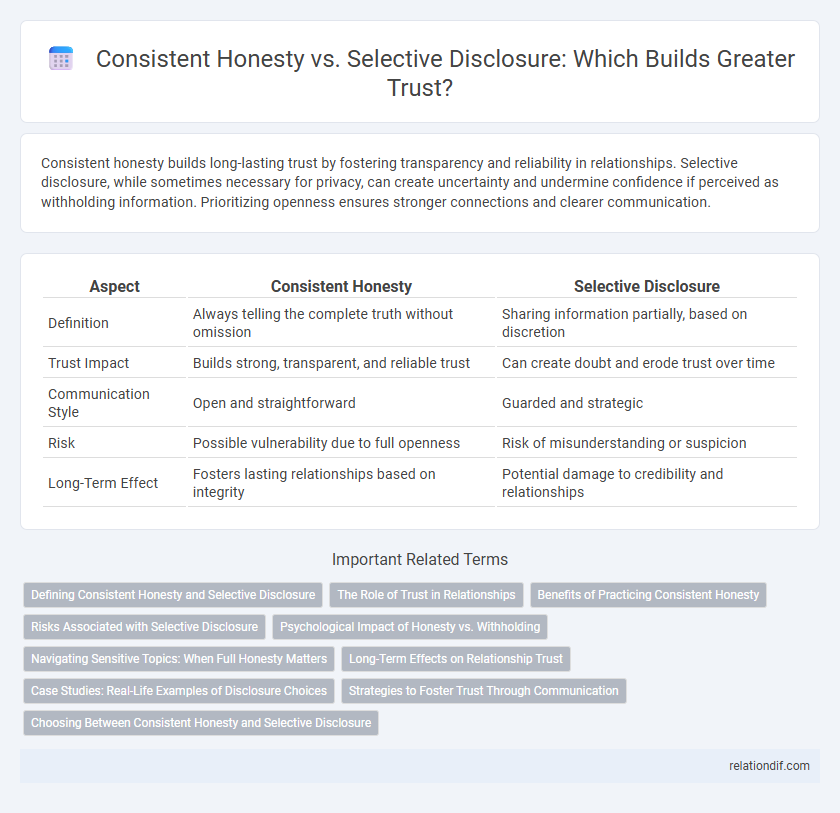Consistent honesty builds long-lasting trust by fostering transparency and reliability in relationships. Selective disclosure, while sometimes necessary for privacy, can create uncertainty and undermine confidence if perceived as withholding information. Prioritizing openness ensures stronger connections and clearer communication.
Table of Comparison
| Aspect | Consistent Honesty | Selective Disclosure |
|---|---|---|
| Definition | Always telling the complete truth without omission | Sharing information partially, based on discretion |
| Trust Impact | Builds strong, transparent, and reliable trust | Can create doubt and erode trust over time |
| Communication Style | Open and straightforward | Guarded and strategic |
| Risk | Possible vulnerability due to full openness | Risk of misunderstanding or suspicion |
| Long-Term Effect | Fosters lasting relationships based on integrity | Potential damage to credibility and relationships |
Defining Consistent Honesty and Selective Disclosure
Consistent honesty involves maintaining transparency by consistently sharing truthful information regardless of circumstances, fostering long-term trust and credibility. Selective disclosure refers to the strategic sharing of information tailored to specific audiences or situations, balancing openness with confidentiality to protect interests. Both approaches influence trust dynamics, with consistent honesty enhancing reliability and selective disclosure managing vulnerability.
The Role of Trust in Relationships
Consistent honesty establishes a foundation of trust by ensuring transparency and reliability in relationships, fostering long-term emotional security. Selective disclosure, while sometimes strategic, risks undermining trust when withheld information creates uncertainty or doubt. Trust deepens as individuals perceive authenticity and predictability in communication, reinforcing mutual respect and commitment.
Benefits of Practicing Consistent Honesty
Practicing consistent honesty fosters stronger relationships by building unwavering trust and credibility, which enhances communication and collaboration. Transparent behavior reduces misunderstandings and conflicts, promoting a positive organizational culture. Consistent honesty also supports ethical decision-making, reinforcing accountability and long-term success.
Risks Associated with Selective Disclosure
Selective disclosure undermines trust by creating information gaps that may lead to suspicion and misinterpretation. Risks include damaging reputations, legal consequences, and long-term relationship breakdowns due to perceived manipulation or deceit. Consistent honesty fosters transparency and credibility, minimizing these trust-related risks and promoting stronger, more reliable connections.
Psychological Impact of Honesty vs. Withholding
Consistent honesty fosters deep psychological trust by reinforcing predictability and emotional safety, reducing cognitive dissonance and anxiety. Selective disclosure, while sometimes strategically employed, can trigger suspicion and undermine long-term relational stability due to perceived manipulation or deceit. The psychological impact of honesty is associated with transparency and mutual respect, essential for resilient interpersonal bonds.
Navigating Sensitive Topics: When Full Honesty Matters
Navigating sensitive topics requires a balance between consistent honesty and selective disclosure to maintain trust without causing unnecessary harm. Full honesty matters most when the information directly impacts the other person's well-being or decision-making, fostering transparency and deeper connection. In these situations, openness promotes mutual respect and prevents misunderstandings that can erode trust over time.
Long-Term Effects on Relationship Trust
Consistent honesty fosters deep, lasting trust by creating a foundation of transparency that reduces uncertainty and strengthens emotional bonds. Selective disclosure may protect short-term interests but often leads to doubt and suspicion, eroding trust over time. Long-term relationships thrive when openness prevails, enabling resilience through challenges and reinforcing mutual respect.
Case Studies: Real-Life Examples of Disclosure Choices
Case studies reveal that consistent honesty in leadership fosters long-term trust and accountability, as exemplified by companies like Patagonia, which openly shares supply chain challenges. Selective disclosure, seen in the early stages of Tesla's product development, can protect competitive advantages but sometimes risks stakeholder skepticism when withheld information later surfaces. These real-life examples demonstrate the delicate balance organizations must manage between transparency and strategic information control to maintain credibility and trust.
Strategies to Foster Trust Through Communication
Consistent honesty in communication builds a foundation of trust by promoting transparency and reliability, encouraging open dialogue without hidden agendas. Selective disclosure, when used strategically, enhances trust by sharing relevant information tailored to the audience's needs, avoiding information overload or unnecessary anxiety. Effective strategies to foster trust include maintaining clarity, demonstrating empathy, and aligning messages with values, ensuring that communication remains honest yet considerate.
Choosing Between Consistent Honesty and Selective Disclosure
Choosing consistent honesty fosters long-term trust by ensuring transparency and reliability in communication, strengthening relationships through unwavering integrity. Selective disclosure may protect sensitive information temporarily but risks eroding trust if omissions are discovered, leading to skepticism and damaged credibility. Prioritizing consistent honesty ultimately supports a foundation of trust that is resilient and enduring in personal and professional interactions.
Consistent Honesty vs Selective Disclosure Infographic

 relationdif.com
relationdif.com